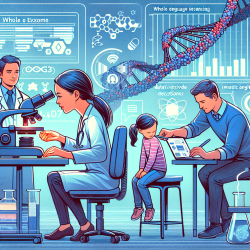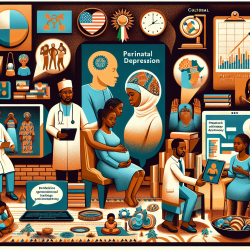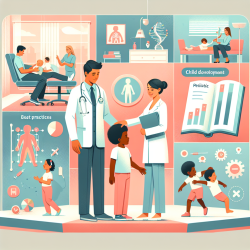Introduction
As a speech-language pathologist, understanding the underlying causes of autism spectrum disorders (ASD) is crucial for developing effective therapeutic strategies. Recent advancements in genetic research, such as the study titled "Whole Exome Sequencing in Females with Autism Implicates Novel and Candidate Genes," provide valuable insights that can enhance our practice. This blog explores how these findings can be applied to improve outcomes for children with ASD.
Understanding the Study
The study conducted whole exome sequencing on 30 well-characterized Caucasian females with autism, identifying between 100 and 300 genes showing genomic variants per subject. By narrowing down these variants using predictive parameters like GERP2, PolyPhen2, and SIFT, researchers identified 78 genes that met the selection criteria. Notably, five females presented with functional variants of X-linked genes, highlighting the potential role of genetic factors in ASD.
Implications for Practice
For practitioners, these findings underscore the importance of considering genetic factors when assessing and treating children with ASD. Here are some practical steps to integrate these insights into your practice:
- Incorporate Genetic Screening: Encourage families to consider genetic testing, especially in cases where ASD is present in multiple family members. Understanding genetic predispositions can inform personalized therapy plans.
- Collaborate with Geneticists: Establish partnerships with geneticists to interpret genetic findings and their implications for speech and language development. This collaboration can lead to more tailored interventions.
- Educate Families: Provide families with information about the genetic aspects of ASD and how these may influence their child's development. Empowering families with knowledge can enhance their engagement in the therapeutic process.
- Stay Informed: Keep abreast of the latest research in genetics and ASD. Continuous learning will enable you to incorporate cutting-edge insights into your practice.
Encouraging Further Research
The study highlights the need for further research into the genetic underpinnings of ASD, particularly in females who are historically understudied. Practitioners can contribute to this research by:
- Participating in Studies: Collaborate with researchers by enrolling patients in studies that seek to understand the genetic basis of ASD.
- Collecting Data: Document and share clinical observations that may provide insights into genetic influences on speech and language development in children with ASD.
- Advocating for Research Funding: Support initiatives that aim to secure funding for genetic research in ASD, emphasizing the potential for improved therapeutic outcomes.
Conclusion
Integrating genetic insights into speech-language pathology can significantly enhance our ability to support children with ASD. By embracing data-driven approaches and fostering interdisciplinary collaboration, we can contribute to more effective and personalized interventions. To delve deeper into the original research, please follow this link: Whole Exome Sequencing in Females with Autism Implicates Novel and Candidate Genes.










